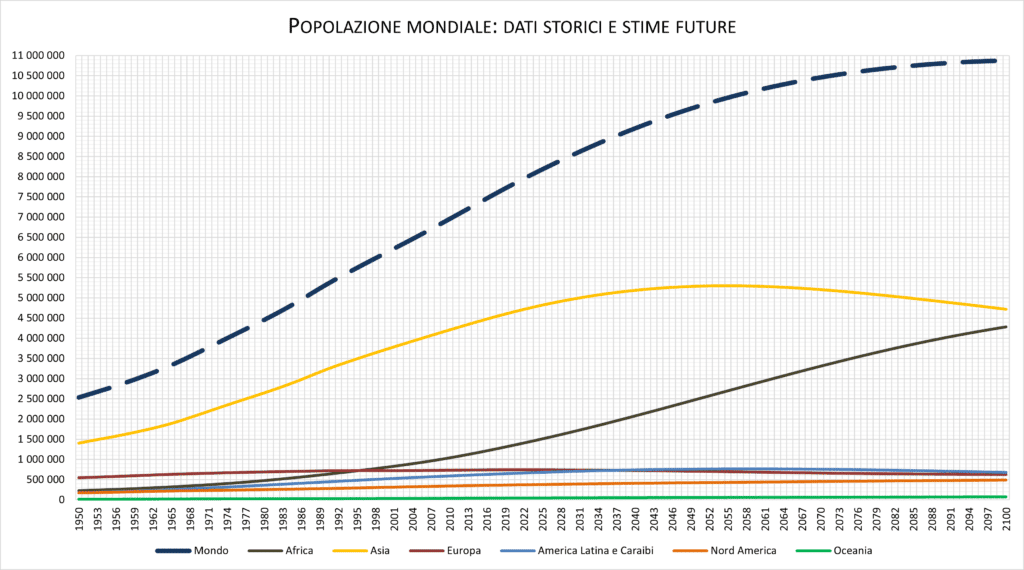How many inhabitants in the world! One of the major lessons in world demographic history is that the growth of the world population is tearing.
How many people are there in the world? For many nations, growth has already ended, and with the general decline in fertility, the rest of the planet will also stop its race towards global overpopulation. Yes, the world population will slow down, the inhabitants throughout the world will be fewer: the statistics on the real number of the earth's inhabitants will no longer show any total increase. Far from it.
There is no real world population counter that in real time counts the births and deaths of people in the world: the thing that comes closest to a system of world statistics in real time is worldometer. Today, at the time of the last update of this post (May 2021), the number of inhabitants of the earth is approximately 7,8 billion.
However, the historical series that allow the elaboration of world statistics do exist. They won't allow you to control the live world population, but that's pretty much all we have. And after the demographic explosion recorded a few decades ago (on practically all continents), the number of inhabitants on earth could change dramatically.

As can be seen from the demographic graph, the population in the world has had constant growth in recent centuries. Until the Second World War, around 1950. Those are the years of what on a medical level is defined as "growth", almost a small "bubo" ready to burst. And so it was with this “demographic growth”. From that moment on, the world's population began to grow exponentially. The current world population is approaching the "peak" expected in less than 80 years, almost to a standstill. At that point, the number of inhabitants of the earth should remain constant. It's hard to believe, but the prediction regarding the distribution of the increase in the earth's population has always remained the same: population growth is increasingly expected in large cities.
The world population graph collects data on the evolution of global population growth. It collects them from the Population Division of the United Nations Department of Economic and Social Affairs. It essentially tells us how many inhabitants there are in the world.
Dai data analyzed by the United Nations we know from an estimate that until 1700 the growth rate of the world population has been very slow: the updated statistics say only 0.04% per year. Of course, past peoples had more fertility, but infant mortality offset this trend: it was the first phase of the demographic transition. The current world population is subject to other dynamics.

And in 2100 comes the confirmation: we will be less than expected
In a recent UN report that analyzes how many people there are in the world and divides them by country, the trend is now clearly expressed. The world population in real time cannot be controlled, as mentioned, but the economic and demographic flows can. And based on this, you can find it in this post, the earth's population will be 2 billion fewer than predicted. The world census will bring many surprises. The number of inhabitants of the world will be "reshuffled", leading currently emerging nations to have an enormous density, and others currently flourishing to see their numbers reduced (US demography reduced, China's population even halved).
With the improvement of general health conditions and the drop in mortality, things have changed quickly for world demography, especially in the 20th century. In terms of demographic evolution, in the last 100 years the world population has more than quadrupled, and my generation (I was born in 1975) has found itself almost at the peak of this growth in the world's inhabitants.
How many are we in Italy?
How many women, men, children live in the beautiful country? The latest survey that took into account both the islands and the continent is from 2019, and says that we have fallen below 60 million. To be precise, the number of people who populate the country is 59.641.488.
The world population has grown in percentage more than 7 times in the past 200 years producing a terrifying impact on the environment. A demographic “white whale”. Giving space, food and resources to as many people as possible is a gigantic challenge.
We must never underestimate it. Global population growth is not a given. AND IL given.
World population updated in October 2019: 7,7 billion.
source: wikipedia
The current growth of the inhabitants of the planet is still dizzying: 140 million people are born every year and how many die? 58 million. Yes, the world population is growing by 82 million a year.
How many are we in the world? Which direction are we going?
In purple is the annual growth rate of the world population: it reached its peak in the last century, precisely in 1968. Since then it has slowed down, and today it stands at 1% per year. The world experiences the end of a large expansion cycle.
This graph also shows how the UN evaluates this process in the near future. With the continued decline in population growth, the current world population is growing more slowly, and the population curve is becoming less steep. By 2100 the growth rate will be 0.1%, the population will be about to completely stop an incredible race, after having increased tenfold in just 250 years.
We are on the eve of a new phase of humanity, in which the balance will not be kept even by high mortality, but by low fertility.
New challenges, new problems to manage, among which there will probably not be overpopulation but its opposite.
Edit: new studies on world demographic statistics confirm this trend, also detailing the characteristics of what will be an authentic geopolitical revolution (or counter-revolution) linked to the world population. I talked about it in this post.


